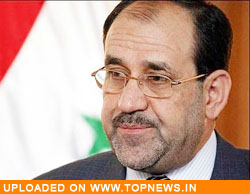Election results show secular powers emerging in Iraq
 Baghdad - Preliminary election results in Iraq showed Prime Minister Nuri al-Maliki's Dawlat al-Qanoon coalition leading in nine of 14 provinces and the emergence of new secular powers.
Baghdad - Preliminary election results in Iraq showed Prime Minister Nuri al-Maliki's Dawlat al-Qanoon coalition leading in nine of 14 provinces and the emergence of new secular powers.
Dawlat al-Qanoon, or State of Law, garnered 38 per cent of the votes in the capital Baghdad and 37 per cent in Basra, the province that accounts for most of Iraq's oil exports, according to the Independent Higher Electoral Commission (IHEC).
In Najaf it secured 16.20 per cent, in Hilla 12.5 per cent, in Samawa 10.9 per cent, in Amara 17.7 per cent, in Nassriya 23.1 per cent, in Qaddesiya 23 per cent, in Wassit 15.3 per cent, in Baquba 6 per cent, in Karbala 8 per cent and in Salah Eddin 3.5 per cent.
Al-Maliki's sweeping success is, for many observers, an indication that the Iraqis support their central government which succeeded in saving the country from the quagmire of civil war and sectarianism.
Religious-based parties that dominated elections in 2005, were shunned by voters in 2009, in a sign of apparent dissatisfaction with their performance and rejection of sectarianism.
In this context, the Islamic Supreme Council of Iraq, a Shiite Islamist party led by the cleric Abdul Aziz al-Hakim was seen as one of the major losers.
Not only has the party been unable to repeat its 2005 performance of winning nearly 55 per cent the provinces, it has even lost to al- Maliki in Hakim's home province of Najaf, where it received barely 5 per cent of the votes.
The Islamic Party, which had lead in two of the four mostly Sunni provinces of Salahuddin and Diyala, lost to secularists and Sahwa or Awakening Councils in Mosul and Anbar.
In Anbar, once the heartland of the Sunni Arab insurgency, a secular party and tribal sheikhs won over the Iraqi Islamic Party, which had run the province since 2005. The sheikhs run US-backed Awakening Councils that helped drive out gunmen from the province.
According to preliminary results, the Iraqi National Project headed by Salih al-Mutlaq lead with 17.6 per cent, followed by the Awakening of Iraq and the Independents by
17.1 per cent.
In the northern Nineveh province the new Arab nationalist party, Al Hadba, took 48.4 per cent, by far the largest share of the votes. Sunnis make up the majority there, though Kurds controlled the provincial government since many Arabs boycotted the ballots in 2005.
The Sunni Islamist Tawafiq bloc, headed by Vice-President Tariq al-Hashemi took the lead in Diyala by 21.1 per cent. Also in Salah Eddin it lead the votes by 14.5 per cent, while coming third in Baghdad.
In Karbala, al-Maliki's home province, an independent Shiite moderate, Youssef Majid al-Habboubi, lead the votes by 13.3 per cent. Al-Habboubi is the first independent candidate to lead in a province that was dominated by religious parties. Ironically, al-Maliki's coalition came third with only 8.5 per cent in the province.
One of the new faces to emerge during elections is the National Reform Trend led by former Iraqi premier Ibrahim al-Jaafari. Despite it is newly established, the party was able to gain votes in 12 provinces. Al-Jaafari established the party three years ago after stepping back from the presidency of the Daawa party run now by al- Maliki.
The Sadrists performed modestly well given that the Sadrists did not formally campaign, coming in a distant second to al-Maliki in Baghdad, with 9 per cent of the vote, and also second in two other southern provinces.
However, coming fourth with 5 per cent in Basra was seen as a major set back to al-Sadr and his followers who until last year appeared to be the most powerful group in Iraqi politics in general and in Basra in particular.
Al-Sadr backed militant groups attempting to control Basra. Last year, the militant network was effectively destroyed by government forces under al-Maliki.
Meanwhile, around 10 per cent of the vote in the January 31 elections remains uncounted. Final results are expected in the coming weeks.
More than 14,000 candidates from 400 political parties took part in the elections. dpa